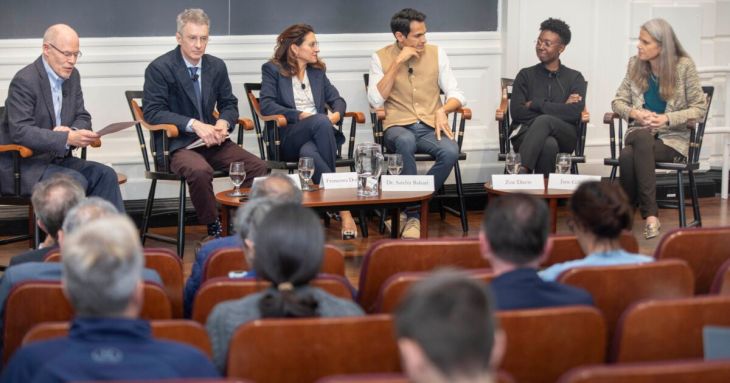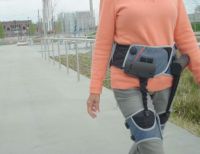Satchit Balsari, who conducts research among members of India’s largest labor union for women in the nation’s informal economy, did research in Gujarat among the millions of people who are already living with a global climate that has increased 1 degree Celsius. While that rise may seem a small change, that global average is experienced through much wider daily swings in some areas in the form of longer and hotter heat waves, warmer winters, higher nighttime temperatures and more extreme weather events, such as stronger storms or wildfires.
One thing that has become apparent, said Balsari, an assistant professor of global health and population at the Harvard T.H. Chan School of Public Health, is that when talking about individuals, microenvironments matter much more than global averages, because those environments are what affect people as they live and work.
Balsari shared stories of a street vendor, a weaver who works in a building whose rooftop temperature was 10 to 15 degrees above that of the surrounding area, who put up awnings to create shade from the sun, only to have them taken down because they blocked security cameras.
“It’s very hot, and it cools down a little bit at night, but in their work environment, in the lived experience in their homes, there’s this constant experience of ‘It’s too hot,’” said Balsari, who is also an assistant professor of emergency medicine at Harvard Medical School.
As hot as this year has been globally, experts who gathered for the event only expect it to get hotter in the decades to come.
“This is an issue for the long run. Yes, things are bad now. We’re at 1.3, 1.2 (degrees Celsius above preindustrial temperatures) now; we’re going to blow through 1.5. We’re going to probably blow through 2,” said James Stock, vice provost for climate and sustainability and director of the Harvard Salata Institute for Climate and Sustainability. “It gets worse nonlinearly really quickly.”
Stock offered closing remarks at the event, which wrapped up Worldwide Week at Harvard and included lectures, performances, exhibitions, and other events across campus to highlight the ways in which the University interacts and intersects with the world around it through the sciences, arts, culture, politics, and other disciplines.
Joining Stock, Balsari, and Gilbert were Spencer Glendon, founder of the nonprofit Probable Futures; Francesca Dominici, co-director of the Harvard Data Science Initiative; Zoe Davis, climate resilience project manager for the city of Boston; and moderator John Macomber, senior lecturer at Harvard Business School. Harvard Provost Alan Garber and Mark Elliott, vice provost for international affairs, offered opening remarks.
Panelists agreed that better data collection is key to adapting solutions to circumstances that vary widely even across small geographic areas. Interventions such as providing vulnerable populations with air conditioners, for example, may be valuable in low-income communities, but less so in nearby communities with wealthier residents.
In Miami-Dade County, Gilbert said, air conditioners are considered life-saving equipment to the extent that, after Hurricane Irma, the state required nursing homes to have back-up power supplies so that residents could be cooled even in a power outage. ZIP codes with the highest land temperatures — which also tend to be low-income neighborhoods — have four times the rate of hospital admissions during heat waves as other parts of the region.
Gilbert echoed other panelists in calling for better, more granular data through more widespread use of sensors, including wearable sensors that can record heat impact on individuals. With different microclimates affecting different people, different jobs — whether someone is in an office or working at a construction site — also matter, both to public health officials and business leaders. Estimates of the potential economic impact of extreme heat in the Miami metro area are around $10 billion per year in lost productivity.
Nonprofit leader Glendon said we’re entering an unprecedented climate era. Humans were nomadic, regularly moving to where conditions were best, until about 10,000 years ago, when the temperature stabilized to the narrow range that we now consider normal. Centered in the range that humans prefer, climate stability helped foster human settlement and the rise of civilizations.
In the 10,000 years since, Glendon said, everything we’ve created, from building designs to cultural practices, has been made with the unstated assumption that this stable temperature regime — averaging roughly 60 degrees Fahrenheit — will continue. Recent decades’ warming and the projected warming in the decades to come will push heat and humidity in some places beyond the range that the human body can cool itself, with unknown consequences for societies.
“Everything is built on that stability, on the assumption that those ranges are fixed,” Glendon said. “It’s in building codes, grades of asphalt, architecture. … Those ranges are embodied so they became unconscious, but we need to make them conscious, and ideally they motivate us to avoid 2, 2½, or 3 degrees.”















